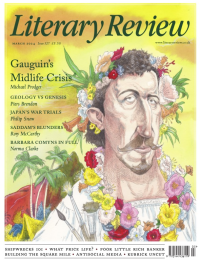Dmitri Levitin
Sources & Sorcery
Magus: The Art of Magic from Faustus to Agrippa
By Anthony Grafton
Allen Lane 289pp £30
‘Read with care and precision, dear reader, and you will marvel and will not be sorry.’ So advises a Latin note scribbled in 1550 by a Benedictine monk into his copy of Cornelius Agrippa’s De occulta philosophia (1533), a book promising full reform of the ‘sublime and sacred science’ of magic. Alas, not everyone was so enthusiastic: Agrippa’s book was condemned as heretical by the inquisitor of Cologne.
At the same time, it received approbation from the city’s archbishop. The place of magic in Renaissance Europe was much contested. So was its definition. Today, every child who has read the Harry Potter books will have a sense of what its components should be. But even here there are ambiguities. After all, Hogwarts students must study astronomy, which seemingly has no magical content. Agrippa himself expressed an ambivalent attitude when, in the final chapters of his book, he condemned as superstitious (or worse) many of the magical practices he had previously discussed. ‘The art of occult philosophy is refuted and rejected by its own inventor. Well, then, farewell to it, in the name of the devils’, our Benedictine dutifully noted in the margin.
Anthony Grafton has plunged himself into this cauldron of ambiguities in his scholarly but marvellously readable Magus. The study of Renaissance magic has a long history. Predictably, many have dismissed it as charlatanry or self-delusion. Others have found in it nothing less than the origins of modern science. Grafton is too careful a scholar to subscribe to such grand generalisations or to present an essentialised ‘Renaissance magic’. Instead, he follows the trail of evidence in an attempt to recover the mental world of the 16th-century magus in all its bewildering and bewitching complexity.
Like all the best historians of the Renaissance, Grafton knows that none of its aspects emerged suddenly upon the wave of an intellectual wand. Accordingly, he begins by charting the late medieval debate about magic. By the 14th century, astrology had become central to the European system of knowledge. It

Sign Up to our newsletter
Receive free articles, highlights from the archive, news, details of prizes, and much more.@Lit_Review
Follow Literary Review on Twitter
Twitter Feed
Few writers have been so eagerly mythologised as Katherine Mansfield. The short, brilliant life, the doomed love affairs, the sickly genius have together blurred the woman behind the work.
Sophie Oliver looks to Mansfield's stories for answers.
Sophie Oliver - Restless Soul
Sophie Oliver: Restless Soul - Katherine Mansfield: A Hidden Life by Gerri Kimber
literaryreview.co.uk
Literary Review is seeking an editorial intern.
Though Jean-Michel Basquiat was a sensation in his lifetime, it was thirty years after his death that one of his pieces fetched a record price of $110.5 million.
Stephen Smith explores the artist's starry afterlife.
Stephen Smith - Paint Fast, Die Young
Stephen Smith: Paint Fast, Die Young - Jean-Michel Basquiat: The Making of an Icon by Doug Woodham
literaryreview.co.uk